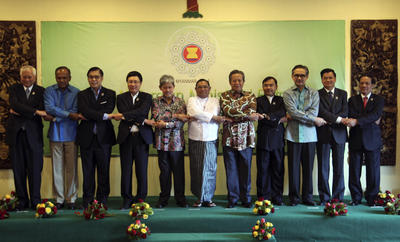Under the leadership of a quasi-civilian government, Myanmar has undertaken the path towards substantial reforms, including a loosening of the political system, freedom of the press and economic liberalisation. This has not only convinced Napyidaw’s ASEAN neighbours, but has also managed to woo the major powers, including the United States, into according Myanmar political legitimacy, leading to the easing of sanctions.
As the ASEAN Chair Myanmar has the opportunity to discard its previously isolationist foreign policy to become a responsible stakeholder in the international community. This year is Naypyidaw’s turn to steer ASEAN in dealing with contentious regional issues, including the South China Sea disputes. Naypyidaw’s challenge now is to translate this ‘chairmanship’ into a commendable ‘leadership’ role.
Apart from raising its international profile, chairing ASEAN could potentially unlock greater economic opportunities for Myanmar. This includes growing investor confidence and further integration with ASEAN and the wider regional economic communities.
ASEAN’s goal is to create a single Southeast Asian market and regional trading bloc by 2015. However, Myanmar remains ASEAN’s poorest member with a GDP of only US$53 billion, contributing only 0.2 per cent of continent-wide production in mainland Southeast Asia. Myanmar would undoubtedly struggle to meet the strict policy reform requirements for the ASEAN Economic Community in the specified time frame.
Nevertheless increased investor confidence after the ASEAN chairmanship could help narrow the crucial gaps in critical infrastructure and employment, as well as provide the momentum to achieve market regulation and greater human capacity in Myanmar.
Domestic economic reforms have already helped to increase the flow of foreign capital into Myanmar. In a recent report by the private sector, Myanmar was listed as one of five countries that had made the greatest improvements over the last five years to their business environment. The floating of its national currency, the Kyat, as well as the enactment of a new Foreign Investment Law to regulate foreign ownership limits and land leasing rules, have not only made Naypyidaw more attractive to foreign investors but have also enabled its rich natural resources to be exploited further. One report suggests Myanmar’s energy and mining sector is projected to expand to US$22 billion by 2030 from US$8 billion in 2010.
However, Myanmar’s capacity to fully exploit such opportunities is questionable at best. Endemic corruption, lack of transparency, limited legal recourse, strict approval procedures to rebuild infrastructure, which are slow and costly, and remaining Western economic sanctions continue to stifle the country’s economic growth. There has also been a brain drain of skilled workers to neighbouring countries that offer higher wages. The International Finance Corporation, a branch of the World Bank, recently ranked Myanmar 182 out of 189 countries for the ease of doing business within its borders.
While the economic payoffs in hosting ASEAN may be great, more reforms must be made to create an inviting business environment to set the stage for Myanmar’s full integration within the ASEAN Economic Community.
While most regional countries want Myanmar to succeed in its path to democratisation, ASEAN’s support of Myanmar will not be unconditional. The prestige and legitimacy associated with being at the helm of Southeast Asia’s regional bloc must not obscure the fact that Myanmar still has a long way to go, particularly in protecting human rights and pursuing national reconciliation.
National reconciliation presents the biggest hurdle to Myanmar’s reform process. Some outsiders remain sceptical of Myanmar’s development amid ongoing internal inter-ethnic conflict. Myanmar expects ASEAN to recognise its national reconciliation efforts to solve deep-rooted ethnic conflicts through individual ceasefire deals and comprehensive peace settlements for a nationwide reconciliation.
Myanmar’s inter-ethnic violence continues to strain other ASEAN countries due to the refugee outflow of Rohingya Muslims to Thailand, Malaysia and Indonesia. The Rohingya issue might also spillover to Myanmar’s neighbouring states and pose a potential security threat to some regional countries. In 2013 two Rohingya leaders linked to the Rohingya Solidarity Organisation (RSO) were reported to have enlisted assistance in the form of weapons and tactical knowledge from Indonesian hardline Muslim groups.
At present, peace agreements have not been consolidated. Instead of granting greater autonomy, Naypyidaw is offering economic incentives through development projects to rebel leaders in exchange for signing ceasefire agreements. While this process has facilitated re-engagement between the two sides, it is no more than a short-term fix; it is unable to replace sincere political dialogue to address the underlying political, economic and social causes of the ongoing armed conflict.
Slow progress in national reconciliation efforts is also compounded by increasing human rights concerns inside Myanmar, despite Naypyidaw having set up a national human rights commission in 2011. The recent visit by the UN special rapporteur on Human Rights only confirmed Myanmar’s inability to conduct objective investigations on widespread human rights violations and to bring the perpetrators to justice, including those belonging to local security forces.
While a spokesperson for the Myanmar government has announced the Rohingya issue will not be on the ASEAN agenda, he agreed the government will accept advice from individual ASEAN governments on the conflict. ASEAN could thus play an instrumental role in pushing Myanmar from behind to achieve national reconciliation and encourage it to implement the 2012 ASEAN Human Rights Declaration.
As the largest democracy in ASEAN, Indonesia could also cooperate with Naypyidaw to strengthen Myanmar’s civil society and engage in more transparent inter-ethnic dialogues. With the potential regional spillover of Myanmar’s internal strife, Naypyidaw should not interpret ASEAN’s move as intervening in its internal affairs. Rather, it would be in Naypyidaw’s best interests to embrace ASEAN’s assistance with open arms.
Eliane Coates is a Senior Analyst at the Centre of Excellence for National Security (CENS) at the S. Rajaratnam School of International Studies (RSIS), Nanyang Technological University.
This article was first published here as RSIS commentary No. 012/2014.

